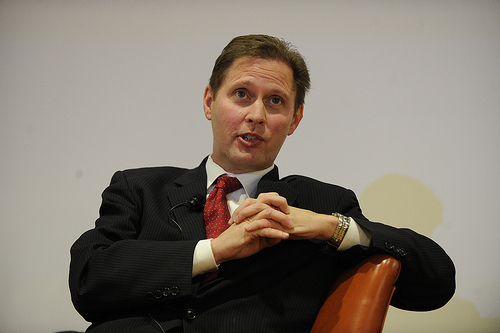There’s a meme being pushed on the right by a few Rick Scott supporters that he waved the white flag on Medicaid expansion as a quid pro quo for “privatizing Medicaid”, which amounts to a waiver for managed care. As Phil Klein notes, that’s Scott’s claim: “[Scott] said he was swayed to back the expansion by the Obama administration’s agreement to grant the state more flexibility in administering Medicaid.” Ed Kilgore claims this quid pro quo is true over here.
But no one who follows these matters believes that this is the way the negotiation happened or is the real reason why Rick Scott flipped on the issue. Scott has low approval ratings, is scared of Charlie Crist, has been targeted by heavily lobbying efforts from his former colleagues in the hospital industry, and saw an opportunity to use the waiver as political cover. There was no need to tie reform to expansion, and that’s not what was going to happen in this case. Florida had expected their waiver request to be approved this year anyway – the Obama Administration had shown a willingness to do so – and while the state was hamstrung by its own statutes (which require reform to be done by waiver method, not the SPA process) in that regard, not even the infamously cold KSeb was going to block this one. They had just approved a very similar waiver for Kansas in December, despite the fact that Gov. Sam Brownback isn’t expanding Medicaid.
The fact that Scott is almost assuredly lying about this quid pro quo should tell you that he recognizes this is a raw deal regarding the expansion. Florida’s Medicaid pilot program approach does have some good things going for it, and it’s worth it for other states to give it a try. But this reminds me a lot of the argument for Medicare Part D. I opposed Part D at the time, even though I think the program has worthwhile elements, in large part because I thought Republicans didn’t get enough out of passing it – the HSAs they created were limited in fundamental ways, and have since been gimped even further. If you’re going to trade bad policy for good, you have to understand the relative value of both.
For their part, Floridians are opposed to the expansion because they understand how costly it will be. Back to Klein:
“Scott argued that Floridians would be paying to help fund the Medicaid expansion in other states anyway, so they may as well get their share of federal funding. But going ahead with the expansion, Florida would be adding about 1 million beneficiaries to one of the costliest government programs. After the Supreme Court decision, the Congressional Budget Office estimated that adding 11 million people to Medicaid would cost $643 billion over the next decade — meaning a back of the envelope estimate is that Scott’s decision could ultimately cost federal taxpayers about $58 billion over the next decade.”
Consider this a reminder: There is no such thing as free money.





